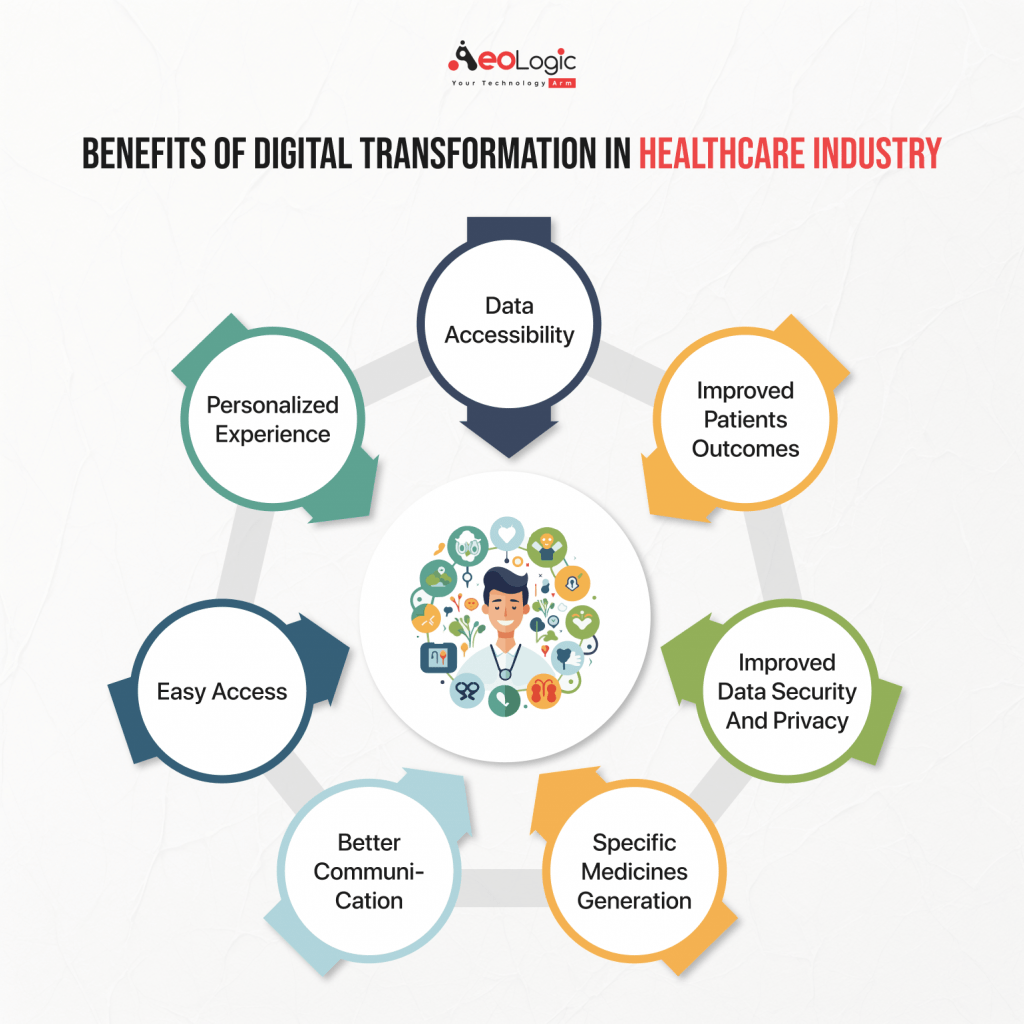The Healthcare industry is one of the most significant industries in the world that plays an important role in treating human beings. However, there are very aspects that are poor in the healthcare industry as still this industry follows conventional methods of treating patients. Around 1 in every 10 patients is harmed in health care and more than 3 million deaths occur annually due to unsafe care. In low-to-middle-income countries, as many as 4 in 100 people die from unsafe care.
This statistic is not good looking as something innovative needs to adapt to change the face of the healthcare industry. Many nations have moved on with the digital world and understand the need to change the treatment methods. They have adopted the digital transformation that made their healthcare industry more enhancive than ever. Stats show that around 92% of healthcare professionals & institutes achieved better performance from digital transformation.
In this article, we will see the role of digital transformation in healthcare industry, and also we will see many other information like benefits, and challenges, and last we will conclude the importance of digital transformation.
What is Digital Transformation in Healthcare Industry?

If we define just the digital transformation then it is the process of employing digital technologies to create new or modify traditional, non-digital corporate processes and services to satisfy evolving customer and market expectations.
Digital transformation in healthcare is defined as the process of actively employing technology to provide value to patients and healthcare organizations in a way that maximizes benefits for both is known as digital transformation in the healthcare industry. Due to the implementation of digital technology tools, patients can get better treatment facilities without too much delay. We will later see some key technologies and examples of digital transformation in the healthcare industry.
Also Read: Role Of Artificial Intelligence In Digital Transformation
Why is Digital Transformation Needed in Healthcare?
The healthcare industry depends on a mostly conventional method of treatment that takes very long to obtain a report, analysis of the report by a doctor, taking too much time in lines for appointments, etc. that overall make a negative impact on patients’ conditions. Where digital transformation supports healthcare providers in the most effective manner possible by streamlining processes, comprehending patient demands, fostering trust, and providing an improved user experience.
Digital tools have immense ability to increase access to health data and give individuals more influence over their health and also provide healthcare practitioners with a comprehensive picture of their patients’s conditions that overall enhances the efficiency and treatment.
These are the 4 key points that demonstrate the growing importance of digital transformation in the healthcare industry.
Patient Expectations
In the present times, it is imperative for patients to have tailored experiences with top-notch healthcare services. Healthcare firms may meet these expectations through digital transformation, whether it is for diagnosis or treatment.
Increase in Chronic Conditions
In addition to ailments associated with the COVID-19 pandemic, the global population is also afflicted by several chronic conditions such as hypertension and diabetes. Monitoring is essential for managing such disorders, and digital transformation enables doctors to remotely monitor patients with these conditions.
Expense Reduction
Healthcare firms are forced to raise the fees for patient care services due to rising administrative costs and overhead expenses. Implementing healthcare digital transformation can automate processes and enhance organizational efficiency, leading to cost reduction and improved services.
Lack of Adequately
The healthcare business is experiencing a significant shortage of skilled people. According to the World Health Organization’s prediction, there will be a shortage of more than 12 million highly trained healthcare professionals worldwide by the year 2035. The shortfall can be addressed through digital transformation.
Also Read: Digital Transformation in Banking: Benefits and Examples
Benefits of Digital Transformation in Healthcare Industry

Digital transformation has some impressive characteristics that offer a lot of benefits to the healthcare industry. Here are a few benefits mentioned below.
Data Accessibility
Data is one of the most important aspects of the healthcare industry. Digital tools eliminate the paperwork and make data more accessible for the doctors as they can analyze the data within less time which is beneficial for patients to get treatment as soon as possible.
Improved Patients Outcomes
With faster diagnosis, individualized care, and more efficient treatment, digital transformation may enhance overall patient outcomes. Healthcare professionals can gather and evaluate enormous volumes of data using technology to spot trends and enhance diagnoses that increase the efficiency of treatment of patients.
Improved Data Security and Privacy
Patient information is stored that is very confidential and needs to be secure to access only authorized access. Sometimes there can be security breaches and data can be stolen. Digital tools secure the data more efficiently as everyone cannot access that easily.
Specific Medicines Generation
There are many medicines that formulation cannot be generated manually and digital tools like AI can help to generate formulas for those medicines immediately by analyzing the disease and other data provided to the AI.
Better Communication
Patients can obtain medications and treatment strategies via email. They can also access professional healthcare services online and communicate with their physicians via video calls.
Easy Access
Personal health records can be easily accessed using digital transformation solutions. Patients can easily monitor and manage their own health information, as well as get full reports, online.
Personalized Experience
Digital healthcare services can offer more personalized experiences, including precise diagnosis and treatment plans. Patients can also receive reminders and alerts about their prescriptions.
Key Technologies in Healthcare Industry
There are a lot of technologies implemented in the healthcare industry as here are a few examples mentioned below.
- The Internet of Medical Things is the advanced technology that can be used to detect the disease of the patient, even chronic diseases also can be detected through IOMT devices. This digital tool helps to treat the patient before it’s too late.
- Cloud computing is another example of digital transformation in the healthcare industry as it is used to store information of patients securely. This allows you to store large amounts of data for a long time on the internet.
- Many wearable technologies can be used to know health-related information such as pulse rate, calorie burn, step count, etc.
Also Read: Benefits of Digital Transformation for Small Businesses
Challenges of Digital Transformation in Healthcare Industry
There are a lot of benefits of digital transformation in industry but also some challenges too. Here are a few challenges mentioned below.
- Providing equal access to healthcare services is a challenge as every person cannot have all services access at a time. Only some authorized members have all services at a time.
- Data processing and analysis is one of the biggest concerns facing the healthcare sector. A portion of the issue arises from the massive volume of data that medical facilities, clinics, and practitioners gather. Better and more individualized patient care is difficult for businesses to provide without strong AI systems to assess this data.
- Integration with the existing system and method of treatment can be also a concern as it takes some time to adapt the existing system.
Also Read: Major Challenges of Digital Transformation in Manufacturing
Final Words
After so much review of detailed information, we conclude that the healthcare sector is undergoing a digital revolution that is fostering efficiency, innovation, and better patient care. Healthcare companies may improve patient experiences, streamline operations, and more successfully handle new issues by utilizing digital technologies. Overall, digital transformation is a basic need for the healthcare industry. Hope this article will be able to make some impact on healthcare institutes and people about the importance of digital transformation in the healthcare industry.







